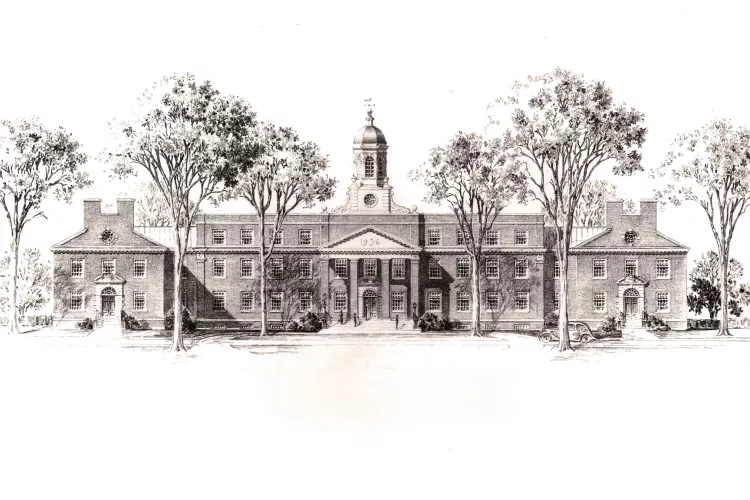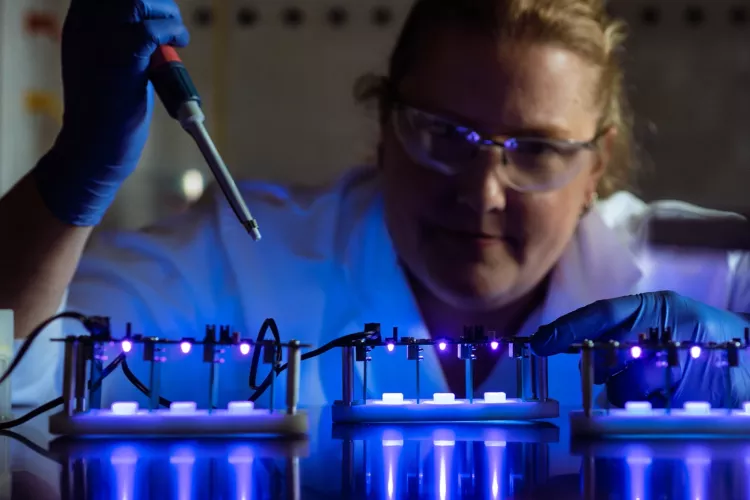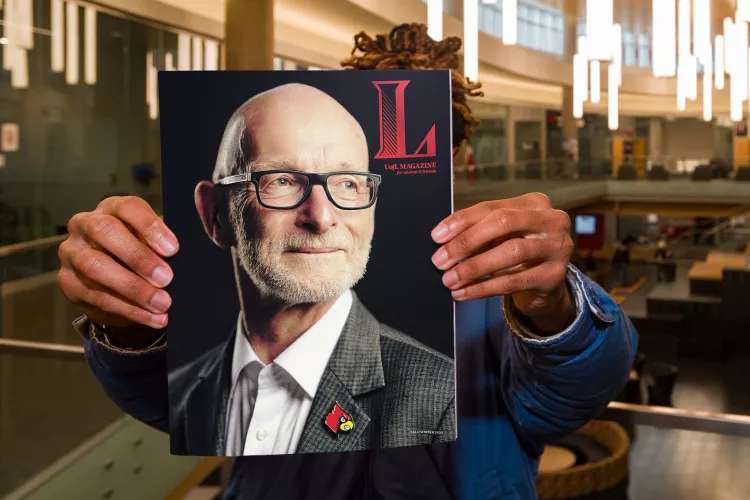UofL-researched reusable, more effective N95-style face masks begin production
October 2, 2024Production has begun on new University of Louisville-developed N95-style face masks that are low-cost, washable, reusable and could be better at filtering COVID-19 droplets and other airborne particles and viruses. The masks now are commercially available.
The production facility, operated by AdhviQ Technologies LLC, opened in late November on the UofL Belknap campus. It now churns out about 50 of the N95-style masks, plus about 100 three-ply non-surgical masks per minute, as well as filters for cloth masks and has made them commercially available. The company plans to ramp up production amid rising coronavirus case numbers.
Mahendra Sunkara said he and other UofL researchers invented the masks to address shortages of personal protective equipment, or PPE. While commonly worn disposable masks are meant only for a single-use, the UofL N95-style masks are unique in that their nanowire-woven fabric can be washed and reused multiple times — all while still filtering down to 0.1 microns.
“Being able to reuse masks and filters effectively can help people protect themselves in everyday settings like grocery stores,” said Sunkara, a UofL chemical engineering professor. “But they could especially help health care workers, who may not have access to as many disposable masks as they need to do their jobs safely. With these masks, they could wash and wear the same one over and over again without losing effectiveness.”
The technology was created by researchers at UofL’s Conn Center for Renewable Energy Research, where Sunkara is director, and the UofL Advanced Manufacturing Institute of Science & Technology (AMIST). Early in the pandemic, they pivoted from their previous studies in areas such as solar power and robotics to develop tools that could help people stay safe.
The researchers teamed up with Advanced Energy Materials (ADEM), a UofL-offshoot company founded by Sunkara that produces nanowire for catalysts, to develop and patent the technology. A new company, AdhviQ, licensed that technology and now manufactures and sells the finished products made using materials from ADEM.
Both ADEM and AdhviQ were created at UofL, are based on UofL research and also are physically located on UofL’s Belknap campus.
“This is an excellent example of what can be accomplished when UofL research meets industry capability,” said Kevin Gardner, UofL’s executive vice president for research and innovation. “In this time of crisis, UofL researchers have risen to the challenge of keeping people safe in every aspect. This is yet another example of them doing the hard work to combat this virus and truly advance our health.”
The masks are made using inorganic nanowires woven into special polymer cloth, forming a porous network whose openings are too small for viral particles to pass through. Because the nanowire is made of titania and zinc oxide, the masks also can easily be disinfected using low-energy ultraviolet light as an alternative to disinfecting with soap and water.
The nanowire masks differ from current N95 masks, which rely on an electrostatic charge on polymer fiber cloth to capture and filter out particles like dust, mold and pollen. The electrostatic masks may not work to filter out liquid droplets or viral pathogens, while the UofL masks can.
“In working together, we have been able to create a truly great product, built on UofL research, that’s reusable, cost-effective and filters better than commonly available disposable masks,” said Siva Kakarala, founder and CEO of AdhviQ. “Our overall goal is to give people the tools that can help them stay safe and healthy.”
The masks are available for order on the AdhviQ website, and the company expects to receive FDA certification soon.
Baylee Pulliam leads research marketing and communications at UofL, building on her experience as an award-winning business, technology, health care and startups reporter. She is a proud product of the UofL College of Arts and Sciences, where she earned her undergraduate degree in English. She also holds an MBA, a Master of Arts in Organizational Leadership and is pursuing a Ph.D. in the latter with a focus on corporate innovation.



